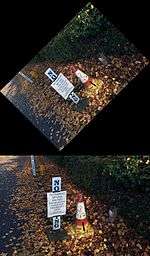Super CCD

Super CCD is a proprietary charge-coupled device that has been developed by Fujifilm since 1999.[1] The Super CCD uses octagonal, rather than rectangular, pixels. This allows a higher horizontal and vertical resolution (at the expense of diagonal resolution) to be achieved than a traditional sensor of an equivalent pixel count.
On January 21, 2003 Fujifilm announced the fourth generation of SuperCCD sensors, in two variations: SuperCCD HR and SuperCCD SR.[2][3] HR stands for "high resolution" and SR stands for "super dynamic range". The SR sensor has two photodiodes per photosite, one much larger than the other. Appropriately processing information from both can yield larger black to white range of brightness (dynamic range).

The 4th Generation Super CCD HR has sensors placed at 45 degrees to the horizontal. In order to convert the images into the normal horizontal/vertical pixel orientation, it interpolates one pixel between each pair of sensors, thereby producing 12 recorded megapixels from 6 effective megapixels. By contrast, Fujifilm says that 5th Generation Super CCD HR sensors are also at 45 degrees but do not interpolate. However, it omits to explain how the sensors turn the image into horizontal/vertical pixels without interpolating.
On July 29, 2005 Fujifilm announced cameras with "5th Generation Super CCD HR sensors", the FinePix S5200 (S5600) and FinePix S9000 (S9500). The FinePix F10 and F11 were released later in 2005.
In 2006 Fuji introduced the 6th generation of the Super CCD sensor (size 1/1.7", 6.3 million effective pixels, except for the F40fd which has size 1/1.6", 8.3 million effective pixels). This sensor allows for acceptable image quality even at ISO 800. It is built into the FinePix S6500fd (2006) bridge camera and the FinePix F-series F30, F20 (2006), F31fd and F40fd (2007) compact cameras, all of which are widely accredited for their class leading low-light capabilities.[4][5]
In late 2007 the 7th generation was introduced (size 1/1.6", 12 million effective pixels). Included in Fuijfilm FinePix F50fd (2007). This sensor, although sharp, has significantly decreased ISO performance compared to earlier generations, dropping in quality to average level.[6] When compared to the 6th generation sensor, the individual pixel area on the 7th generation sensor is approximately 1.7× lower, considerably reducing the amount of light reaching each pixel. In mid-2008 the 8th generation was introduced (same size 1/1.6", 12 million effective pixels), included in Fujifilm FinePix F100fd (2008). This sensor improves slightly on the previously lost ISO performance, but does still not seem to compare with the 6th generation sensors.
In September 2008 Fujifilm announced a new type of Super CCD sensor, the Super CCD EXR.[7] This sensor aims at combining the advantages of the HR and SR sensor types in a single chip. It uses a new color filter array layout that allows for binning (combining) of pixels of the same color. Currently (Apr. 2010) this sensor is used in the F200EXR, F70EXR and F80EXR point-and-shoot cameras and the S200EXR bridge camera. Both the F200EXR and the S200EXR use the same 12 Megapixel 1/1.6" size sensor while the F70EXR and F80EXR use a 10 Megapixel and 12 Megapixel 1/2" sensor respectively.
In 2010, Fujifilm made its last cameras with the Super CCD sensor in the form of the F300EXR and the Z800EXR. Both use the same 1/2" 12 Megapixel SuperCCD EXR sensor with hybrid autofocus system. The camera uses the conventional contrast detection AF and also Phase detection AF by means of dedicated pixels to calculate focus. According to Fujifilm, this system was as fast or faster than a DSLR. In 2011, Fujifilm have decided to use Backside illuminated (BSI) CMOS sensors with conventional square photosited Bayer color pattern array as well as Fujifilm's EXR color filter array that used square photosites that were rotated 45 degrees. This marked the end of the SuperCCD production.
See also
References
- ↑ "New honeycomb "Super CCD" from FujiFilm". DPReview. October 20, 1999. Retrieved 2007-12-17.
- ↑ "Fujifilm announce SuperCCD SR". DPReview. January 21, 2003. Retrieved 2007-12-17.
- ↑ "Fujifilm announce SuperCCD HR". DPReview. January 21, 2003. Retrieved 2007-12-17.
- ↑ "Compact Camera High ISO modes: Separating the facts from the hype". DPReview. May 2007. Retrieved 2008-01-13.
- ↑ "Fujifilm FinePix F40fd". TrustedReviews. June 2007. Retrieved 2008-08-08.
- ↑ "Fujifilm FinePix F50fd". TrustedReviews. December 2007. Retrieved 2008-08-08.
- ↑ "Fujifilm announces Super CCD EXR". dpreview.com. September 2008. Retrieved 2008-09-22.